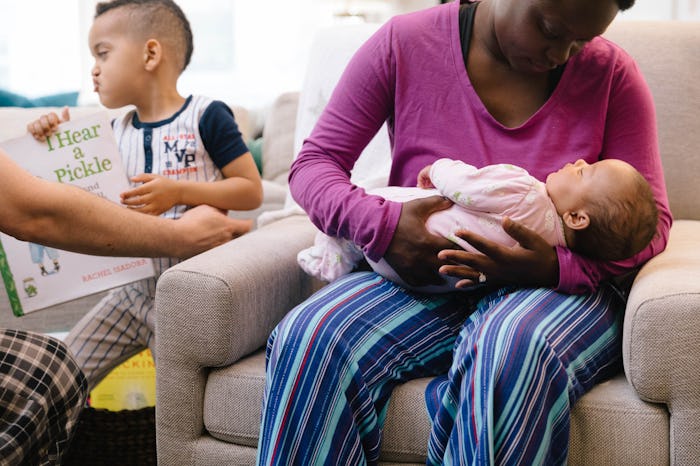Life
Can You Pee After Birth? "Can" & "Want" Are Two Different Things
After labor and delivery, a woman's body is in serious need of recovery time. It's a lot of work to have a baby, and postpartum life can affect you in ways you wouldn't think to consider. A sudden thirst that can't be quenched (from hours of consuming only ice chips), extreme fatigue and exhaustion from the day's events, and an urge to go to the bathroom are all issues new mothers face in the first few post-delivery moments. So, can you pee after birth, or is it something that should be avoided? Turns out, "can" and "want" are two very different things. Go figure, right?
The Mayo Clinic advises new mothers on exactly what to expect immediately after birth, stating vaginal soreness, discharge, and swelling and/or bruising on the tissue that surrounds the bladder can be expected. All of the aforementioned might cause a stinging feeling when urinating, and the bruising surrounding the bladder can make you feel like you need to go to the bathroom (even if you try and can't). If this happens, Sheryl A. Ross, M.D., suggests the aid of an over-the-counter pain reliever and spraying warm water on the affected area to sooth any potential pain you might feel while attempting to empty your bladder.
It's absolutely normal to experience the sensation of needing to pee after you've delivered a baby, though some women don't feel much at all. This all depends on medications involved (such as epidurals and other pain medications), as well as how strong your pelvic muscles were to begin with. Fit Pregnancy actually talks expecting women through how to make those muscles, via Kegels and other methods, stronger before labor, so you're better prepared for what happens in the bathroom afterwards.
The University of Michigan Health System says you should attempt to urinate within 2-3 hours of giving birth, and to let nurses know if you have problems urinating, or are urinating an uncommmon amount. Both can happen, and both can alert your health professionals to a possible underlying condition that would require continued treatment. In fact, it's not uncommon for some women to require a catheter, as the bladder has been through some trauma as the result of 40 weeks (more or less) of pregnancy, plus labor and delivery. In other words, the organ might just need as much rest as the woman it belongs to.
Whether or not to pee after birth is a question you should ask your health care provider, though, the common census seems to be you can, and you should, if you're able. Keep in mind that it can take weeks for the urinary tract and bladder to recover from having a baby, so if it doesn't happen on the first try, be patient and try again when you're ready.
